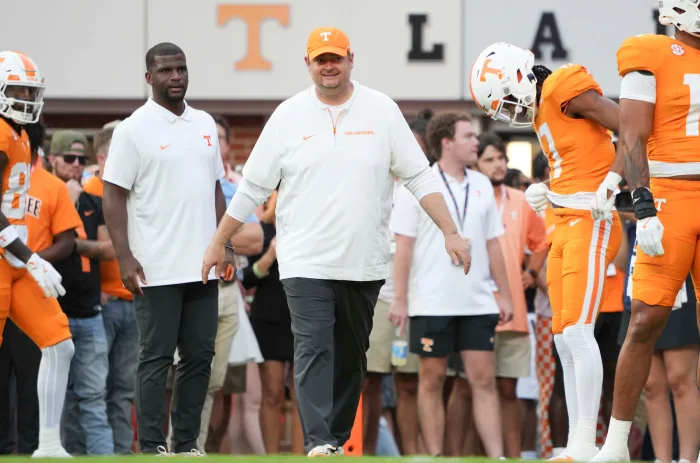In a stunning and unwarranted outburst, an Oklahoma-based radio host recently took a classless shot at Tennessee Volunteers head coach Josh Heupel. The comments, which quickly circulated across social media and sports news outlets, have sparked backlash from fans and sports pundits alike. Many view the remarks as not only disrespectful but also unnecessary, given Heupel’s professional accomplishments and the growing success of the Tennessee football program under his leadership
During a live broadcast, the radio host—whose identity has been at the center of much of the controversy—delivered an unprovoked tirade aimed at Josh Heupel, the former Oklahoma quarterback and offensive coordinator. The radio host criticized Heupel’s coaching style, his tenure at Oklahoma, and his recent success at Tennessee, labeling his accomplishments as “overrated” and suggesting that Heupel lacked the charisma or strategic mind to lead a top-tier football program.
This criticism comes despite Heupel’s recent achievements with the Tennessee Volunteers, where he has revitalized a historically proud football program and brought them back into national relevance. The timing and tone of the remarks have left many questioning the radio host’s motives, with some suggesting that the outburst may be rooted in unresolved bitterness over Heupel’s departure from Oklahoma several years ago.
To fully understand the context of this situation, it’s essential to recognize Josh Heupel’s deep connection to the University of Oklahoma. Heupel, a former star quarterback for the Sooners, led the team to a national championship in 2000. His performance during that season cemented his place in Oklahoma football lore, and he remains a beloved figure in the school’s history for his contributions as a player.
Following his playing career, Heupel transitioned into coaching and served as the offensive coordinator for Oklahoma from 2011 to 2014. During his time on the Sooners’ coaching staff, Heupel helped guide one of the most explosive offenses in the country. However, his tenure ended abruptly after the 2014 season when he was fired by then-head coach Bob Stoops. The dismissal was seen as a turning point for both Heupel and the program, with many Sooners fans feeling mixed emotions about his departure.
Since leaving Oklahoma, Heupel has steadily climbed the coaching ranks. After successful stints at Utah State and Missouri, Heupel took over as head coach at UCF, where he led the Knights to a 28-8 record over three seasons. His success in Orlando paved the way for his current role at Tennessee, where he has been lauded for bringing the Volunteers back into contention in the ultra-competitive Southeastern Conference (SEC).
At Tennessee, Heupel has overseen a remarkable transformation of the Volunteers’ football program. In his first season as head coach in 2021, Heupel inherited a program reeling from several disappointing seasons and NCAA investigations. Despite the obstacles, Heupel’s offensive system quickly took hold, and Tennessee finished with a respectable 7-6 record.
In 2022, the Volunteers made an even bigger leap, winning 11 games and defeating traditional powerhouses like Alabama and LSU. Under Heupel’s guidance, Tennessee’s high-octane offense became one of the most feared in the country, with star quarterback Hendon Hooker leading the charge. Heupel’s success has reignited passion among Tennessee’s fan base and put the program back in the conversation as one of the best in the SEC.
Given his impressive achievements, the attack from the Oklahoma radio host has been met with widespread disapproval. Many believe the comments were a personal jab aimed at Heupel rather than a fair critique of his coaching capabilities.
Unsurprisingly, the radio host’s remarks have sparked outrage among Tennessee fans and the broader college football community. Many have rushed to Heupel’s defense, pointing to his accomplishments both as a player and a coach. Several prominent figures in sports media have called the comments unprofessional and out of bounds, highlighting that personal attacks have no place in sports broadcasting.
Heupel himself has not responded publicly to the criticism, maintaining his focus on the upcoming season. His quiet strength and professionalism in the face of the attacks have only further endeared him to Tennessee fans, who see him as the right leader to guide the Volunteers back to national prominence.
Meanwhile, the backlash has also led to renewed discussions about Heupel’s legacy at Oklahoma and his ongoing success at Tennessee. Many Sooners fans have expressed disappointment in how Heupel was treated by the Oklahoma administration during his coaching tenure, and some believe that the radio host’s comments reflect lingering bitterness from that period.
Ultimately, the radio host’s classless comments about Josh Heupel seem to stem more from personal grievances than any legitimate critique of his coaching abilities. Heupel’s record speaks for itself—both at Oklahoma, where he helped deliver a national championship as a player, and at Tennessee, where he has rejuvenated a once-struggling program.
The incident highlights the fine line between analysis and disrespect in sports media. While criticism is part of the game, personal attacks and baseless accusations have no place in public discourse. As for Heupel, he remains focused on building a championship contender in Knoxville, letting his success on the field speak louder than any words of criticism.
